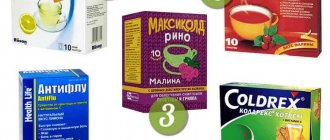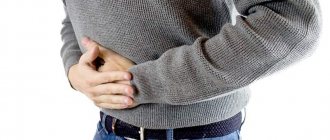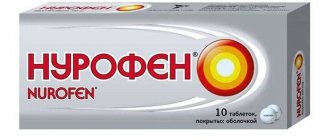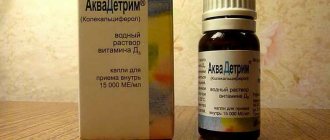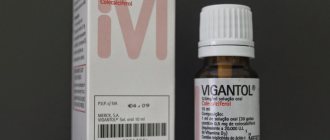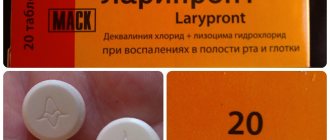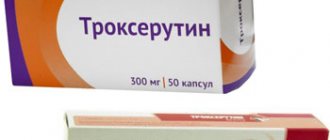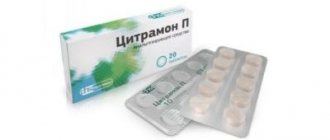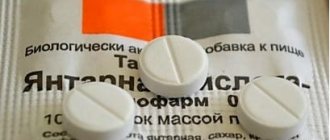Pharmacological properties of the drug Aspirin complex
A combined drug, the effect of which is due to the active components included in its composition. Pharmacodynamics. Acetylsalicylic acid has antipyretic, analgesic, anti-inflammatory and antiplatelet effects. The main mechanism of action of acetylsalicylic acid is the inactivation of the COX enzyme, as a result of which the synthesis of prostaglandins, prostacyclins and thromboxane is disrupted. Due to a decrease in the production of prostaglandins, the severity of their pyrogenic effect on thermoregulation centers decreases. In addition, the sensitizing effect of prostaglandins on sensory nerve endings is reduced, which leads to a decrease in the sensitivity of the latter to pain mediators. The antiplatelet effect of acetylsalicylic acid is due to an irreversible disruption of the synthesis of thromboxane A2 in platelets, as well as its ability to reversibly block COX in endothelial cells, in which prostacyclin, which has antiplatelet activity, is synthesized. Phenylephrine bitartrate is a sympathomimetic. When interacting with α-adrenergic receptors, it causes a narrowing of the arterioles of the nasal mucosa, helping to reduce swelling of the upper respiratory tract and paranasal sinuses, reduces rhinorrhea, lacrimation, and facilitates nasal breathing. Chlorphenamine maleate is an inhibitor of histamine H1 receptors, has an antiallergic effect, reduces the permeability of blood vessels in the mucous membrane of the upper respiratory tract, eliminates itching in the eyes and nose, relieves sneezing and lacrimation. Pharmacokinetics. After ingestion, acetylsalicylic acid is converted into the main metabolite - salicylic acid. Absorption of acetylsalicylic and salicylic acid in the digestive tract occurs quickly and completely. The maximum level of concentration in the blood plasma is reached after 10–20 minutes (acetylsalicylic acid) or 45–120 minutes (total level of salicylates). The degree of binding to plasma proteins depends on the concentration and is 49–70% for acetylsalicylic acid and 66–98% for salicylic acid. 50% of the administered dose of the drug is metabolized during the initial passage through the liver. Metabolites of acetylsalicylic and salicylic acid are glycine conjugate of salicylic acid, gentisic acid and its glycine conjugate. The drug is excreted in the form of metabolites mainly by the kidneys. The half-life of acetylsalicylic acid is 20 minutes; salicylic acid - increases in proportion to the dose taken and amounts to 2; 4 and 20 hours at a dose of 0.5; 1 and 5 g respectively. The drug penetrates the blood-brain barrier, as well as into breast milk and synovial fluid. Phenylephrine bitartrate is absorbed from the gastrointestinal tract and metabolized in the intestinal wall and in the liver through the formation of sulfate conjugates. Phenylephrine and its metabolites are almost completely excreted by the kidneys, the half-life is 21–34 hours. Chlorphenamine is absorbed relatively slowly from the gastrointestinal tract, the maximum concentration in the blood plasma is reached 2–6 hours after oral administration. The half-life is about 24 hours in adults, 9–11 hours in children and more than 24 hours in elderly people. 78–90% of chlorphenamine binds to blood plasma proteins and is distributed in tissues and penetrates the BBB. Chlorphenamine is metabolized mainly in the liver by dimethylation, forming homo- and dimethyl derivatives. The excretion of chlorphenamine and its metabolites is carried out by the kidneys and depends on the pH of the urine.
Use of the drug Aspirin complex
Dissolve the contents of the sachet in a glass of water at room temperature and apply orally after meals. Adults and children over 15 years of age: one sachet every 6–8 hours. The maximum daily dose is 4 sachets, the interval between doses of the drug should be at least 6 hours. Patients with concomitant liver or kidney dysfunction should reduce the dose of the drug or increase it interval between doses. The period of use of the drug without consulting a doctor should not exceed 5 days for pain relief and 3 days when used as an antipyretic.
Pediatric dosage
Is it possible to give acetylsalicylic acid to children? Children are given aspirin only if other medications do not help at temperatures above 38.5 ° C, and if the fever lasts for a long time.
How many tablets can you give per day? Maximum daily dosage:
- Child 2–3 years old: 1 tablet;
- Child 4–6 years old : 2 tablets;
- Child 7–10 years old: 3 tablets.
Single doses also vary by age. So, a child under 4 years of age is given an eighth of a tablet, a child of 5 years and older is given a quarter of a tablet, a child of 10 years of age and older is given a half of a tablet. The medicine needs to be crushed. When the baby has taken it, he should wash it down with warm water or milk. You cannot use lemonade or juice - the acid will have an even stronger effect on the walls of the esophagus. For calculations, take 100 mg tablets. For babies under one year of age, pharmaceuticals containing acetylsalicylic acid are prohibited. But even the use of medication by 14-year-olds needs to be monitored.
The dosage should be confirmed by a doctor, taking into account the baby’s age and disease.
Aspirin is not recommended for use as an antipyretic for more than three days. Pay attention to other means to reduce fever. Acetylsalicylic acid comes not only in tablets. There are other preparations (effervescent pills, mixtures, powders, syrups) containing it. They are also unsafe for babies. They can be taken only for vital indications and under medical supervision. The attending physician will tell you whether the child can take this or that medicine.
Contraindications to the use of the drug Aspirin complex
- acute or chronic peptic ulcer of the stomach or duodenum;
- BA caused by the use of salicylates or other NSAIDs;
- hemorrhagic diathesis, increased tendency to bleeding, hemophilia, hypoprothrombinemia;
- severe renal failure;
- severe liver failure;
- hypersensitivity to acetylsalicylic acid, other salicylates, antihistamines, sympathomimetics, tartazine (cross-reactions with acetylsalicylic acid) or any component of the drug;
- polyposis of the nasal mucosa associated with asthma and intolerance to acetylsalicylic acid;
- arterial hypertension (AH);
- angina pectoris;
- coronary insufficiency;
- urinary retention;
- hyperthyroidism;
- diabetes.
Contraindicated in children under 12 years of age, during pregnancy and breastfeeding. The drug is not prescribed to children under 15 years of age with acute respiratory diseases caused by viral infections due to the risk of developing Reye's syndrome (encephalopathy and acute fatty liver degeneration with the development of acute liver failure). One of the signs of Reye's syndrome is persistent vomiting. Use with caution in patients with chronic lung and kidney diseases, glaucoma, pheochromocytoma, cardiovascular diseases, diabetes mellitus, anemia and prostate hypertrophy.
What is the best way to replace acetylsalicylic acid in a child?
The group of NSAID drugs contains a large number of names, many of which are approved for use at any age and have significantly fewer contraindications and adverse reactions. Instead of Aspirin, children can use the following drugs:
- “Paracetamol” (acetaminophen) - you can use any form of the drug: tablets, syrups, rectal suppositories. Use with caution in babies in the first month after birth. Trade names: “Efferalgan”, “Panadol”, “Tylenol”, “Cefekon”.
- Ibuprofen is the safest NSAID and can be used from 3 months in any form. Trade names: “Maxicold”, “Nurofen”, “Ibufen”, “Burana”, “Iprene”, “Dolgit”, “Faspik”.
- "Diclofenac" is allowed from 6 years of age, rectal forms - from 12 years. It has a pronounced analgesic and anti-inflammatory effect, but a weak antipyretic effect. The following options are available on sale: “Voltaren”, “Ortofen”, “Naklofen”, “Rapten”, “Feloran”.
All of the above medications are allowed during lactation.
In addition to Aspirin, the following products are not recommended for children:
- "Analgin" (metamizole sodium);
- "Amidopyrine";
- "Phenacetin";
- "Nimesulide" - allowed after 12 years.
Side effects of the drug Aspirin complex
Acetylsalicylic acid From the gastrointestinal tract: nausea, anorexia, pain in the epigastric region. In some cases, especially with frequent and long-term use of the drug, the appearance of erosive and ulcerative lesions of the digestive tract, sometimes complicated by latent or clinically significant bleeding (melena). Allergic reactions: urticaria, skin rashes, angioedema (Quincke's edema), bronchospasm and shortness of breath (especially in patients with asthma). From the hematopoietic system: very rarely - the development of thrombocytopenia, anemia (due to hidden bleeding from the gastrointestinal tract), hypoprothrombinemia. From the central nervous system and sensory organs: dizziness, ringing in the ears, headache, hearing loss. From the urinary system: renal failure, acute interstitial glomerulonephritis. In isolated cases (≤1%), toxic liver damage, especially in patients with rheumatoid arthritis, anemia, Reye's syndrome in children (with hepatogenic encephalopathy). Phenylephrine bitartrate From the central nervous system and sensory organs: headache, dry mouth, insomnia, nausea, excitability, anxiety. In isolated cases: from the central nervous system - severe headache, inappropriate behavior; from the cardiovascular system - increased blood pressure, tachycardia; from the urinary system - painful or difficult urination. Chlorphenamine maleate From the nasopharynx and organs of vision: dryness of the mucous membrane of the mouth and nose, impaired accommodation (blurred vision); from the cardiovascular system - tachycardia; from the gastrointestinal tract - constipation; from the urinary system - urinary retention, painful or difficult urination; from the central nervous system and sensory organs - impaired attention, drowsiness, dizziness. Children and elderly patients may experience lethargy or excitability, anxiety, irritability, and dizziness. If any side effects occur, the drug should be discontinued.
Indications for use of Aspirin
According to the instructions, Aspirin is indicated in the following situations:
- rheumatic diseases;
- mild and moderate pain symptoms of various origins;
- acute migraine attacks;
- fever in infectious and inflammatory diseases;
- prevention of embolism and thrombosis;
- secondary prevention of myocardial infarction;
- prevention of myocardial infarction in patients with unstable angina;
- prevention and treatment of transient ischemic disorders of cerebral circulation.
Special instructions for the use of the drug Aspirin complex
Aspirin Complex is used with caution when: combined with anticoagulant drugs; peptic ulcers of the gastrointestinal tract or a tendency to bleeding from the gastrointestinal tract; impaired renal and/or liver function; hypersensitivity to NSAIDs. In patients with allergic diseases, including asthma, allergic rhinitis, urticaria, itching, swelling of the mucous membrane or nasal polyposis, as well as in combination with chronic respiratory tract infections and in patients with hypersensitivity to NSAIDs during treatment with Aspirin Complex, it is possible development of asthma attacks. During surgical procedures (including dental), the use of drugs containing acetylsalicylic acid may increase the likelihood of bleeding. The use of phenylephrine before inhalation anesthesia increases the risk of heart rhythm disturbances, therefore, a few days before planned surgical treatment, you should stop taking the drug or use it if absolutely necessary and only after consulting a doctor. During treatment, you should not drink alcohol due to the increased risk of developing adverse reactions from the gastrointestinal tract associated with taking acetylsalicylic acid and the sedative effect of chlorphenamine. The use of chlorphenamine may affect the results of skin allergy tests, so you should warn your doctor about taking this drug and stop it 3 days before conducting diagnostic tests. During treatment, it is not recommended to use painkillers, sympathomimetics, guanethidine and beta-adrenergic blockers. It is not recommended to use the drug systematically for prophylactic purposes before vaccination. Patients on a low-sodium diet should note that each packet contains 268 mg sodium (equivalent to 1710.73 sodium bicarbonate). The active component of the drug, phenylephrine, can cause a positive result during a doping test in athletes. In elderly patients with renal failure and reduced levels of plasma albumin, the risk of toxic effects of the drug increases. In elderly patients, anticholinergic and CNS-stimulating effects may develop when using the drug in normal doses. Taking acetylsalicylic acid, even in low doses, reduces the excretion of uric acid, which can cause an acute attack of gout in patients with a predisposition. During pregnancy and breastfeeding. The use of the drug is contraindicated in the first and third trimesters of pregnancy. In the second trimester of pregnancy, a one-time dose is possible according to strict indications. Acetylsalicylic acid is excreted in breast milk, which increases the risk of bleeding in the child due to impaired platelet function, therefore, with long-term use of acetylsalicylic acid during breastfeeding, the issue of stopping it should be decided. Influence on the ability to drive vehicles and other mechanisms. Aspirin Complex may cause drowsiness and, therefore, impair the ability to drive vehicles and other machinery.
Aspirin sir
| The above information on the use of this drug is presented for informational purposes only and is intended for specialists. For more complete information, please refer to the manufacturer's instructions included in the package. Before starting to use any drug, it is recommended to consult a doctor. |
Trade name of the drug: Aspirin (Aspirin)
Aspirin York Aspirin cardio Aspirin complex Aspirin express Aspirin-s
International nonproprietary name: acetylsalicylic acid
Dosage form: tablets
Active ingredient: acetylsalicylic acid
Pharmacotherapeutic group: non-steroidal anti-inflammatory drug (NSAID)
Pharmacological properties:
Acetylsalicylic acid (ASA) belongs to the group of non-steroidal anti-inflammatory drugs (NSAIDs) and has analgesic, antipyretic and anti-inflammatory effects due to the inhibition of cyclooxygenase enzymes involved in the synthesis of prostaglandins.
ASA in doses ranging from 0.3 to 1.0 g is used to reduce fever in diseases such as colds and flu, and to relieve joint and muscle pain.
ASA inhibits platelet aggregation by blocking the synthesis of thromboxane A2 in platelets.
Indications for use:
- For symptomatic relief of headache, toothache, sore throat, menstrual pain, muscle and joint pain, back pain.
— Increased body temperature during colds and other infectious and inflammatory diseases (in adults and children over 15 years of age).
Contraindications:
- Hypersensitivity to ASA, other NSAIDs or any excipients of the drug.
— Erosive and ulcerative lesions of the gastrointestinal tract (in the acute phase).
- Hemorrhagic diathesis.
— Bronchial asthma induced by taking salicylates and other NSAIDs.
- Combined use with methotrexate at a dose of 15 mg per week or more.
— I and III trimesters of pregnancy and the period of breastfeeding.
The drug is not prescribed to children under 15 years of age with acute respiratory diseases caused by viral infections due to the risk of developing Reye's syndrome (encephalopathy and acute fatty liver degeneration with acute development of liver failure).
Interaction with other drugs:
Acetylsalicylic acid enhances the toxicity of methotrexate, the effects of narcotic analgesics, other NSAIDs, oral hypoglycemic agents, heparin, indirect anticoagulants, thrombolytics - platelet aggregation inhibitors, sulfonamides (including co-trimoxazole), triiodothyronine; reduces - uricosuric drugs (benzbromarone, probenecid), antihypertensive drugs and diuretics (spironolactone, furosemide).
Glucocorticosteroids, alcohol and ethanol-containing drugs increase the damaging effect on the mucous membrane of the gastrointestinal tract and increase the risk of developing gastrointestinal bleeding.
Acetylsalicylic acid increases the concentration of digoxin, barbiturates and lithium drugs in the blood plasma.
Antacids containing magnesium and/or aluminum hydroxide slow down and impair the absorption of acetylsalicylic acid.
Directions for use and dosage:
The drug is intended for adults and children over 15 years of age: for pain of mild to moderate intensity and febrile conditions, a single dose is 0.5-1 g, the maximum single dose is 1 g. The intervals between doses of the drug should be at least 4 hours. The maximum daily dose should not exceed 3 g (6 tablets).
Take orally after meals with plenty of liquid.
The duration of treatment (without consulting a doctor) should not exceed 5 days when prescribed as an analgesic and more than 3 days when prescribed as an antipyretic.
Side effect:
Gastrointestinal tract: abdominal pain; nausea; vomit; heartburn; obvious (vomiting with blood, tarry stools) or hidden signs of gastrointestinal bleeding, which can lead to iron deficiency anemia, erosive and ulcerative lesions (including perforation) of the gastrointestinal tract; increased activity of liver enzymes.
Central nervous system: dizziness and tinnitus (usually signs of overdose).
Hematopoietic system: increased risk of bleeding..
Allergic reactions: urticaria, anaphylactic reactions, bronchospasm, Quincke's edema.
Special instructions:
Children under 15 years of age should not be prescribed a drug containing acetylsalicylic acid, since in the case of a viral infection the risk of Reye's syndrome increases.
Acetylsalicylic acid may cause bronchospasm, an attack of bronchial asthma or other hypersensitivity reactions. Risk factors are a history of bronchial asthma, fever, nasal polyps, chronic bronchopulmonary diseases, a history of allergies (allergic rhinitis, skin rashes).
Acetylsalicylic acid may increase the tendency to bleeding, which is associated with its inhibitory effect on platelet aggregation. This should be taken into account if surgical interventions are necessary, including minor interventions such as tooth extraction. Before surgery, to reduce bleeding during surgery and in the postoperative period, you should stop taking the drug 5-7 days in advance and notify the doctor. If it is necessary to use the drug during lactation, breastfeeding should be discontinued.
Acetylsalicylic acid reduces the excretion of uric acid from the body, which can cause an acute attack of gout in predisposed patients.
Effect on the ability to drive a car and drive machinery: no effect.
Overdose:
Symptoms
For a moderate overdose: nausea, vomiting, tinnitus, hearing loss, headache, dizziness and confusion are typical. These symptoms disappear when the dose of the drug is reduced.
For severe overdose: fever, hyperventilation, ketosis, respiratory alkalosis, metabolic acidosis, coma, cardiogenic shock, respiratory failure, severe hypoglycemia are characteristic.
Treatment
Hospitalization, lavage, activated charcoal, acid-base balance control, alkaline diuresis to obtain urine pH values in the range of 7.5-8.0 (forced alkaline diuresis is considered achieved when the concentration of salicylate in the blood is more than 500 mg/l (3 .6 mmol/l) in adults and 300 mg/l (2.2 mmol/l) in children, hemodialysis, replacement of fluid loss, symptomatic therapy.
Shelf life: 5 years.
Conditions for dispensing from pharmacies: without a prescription.
Manufacturer: Bayer Consumer Care AG (Switzerland), produced by Bayer Bitterfeld GmbH, (Germany) (4008500120033, 4008500130407, 4008500130414, 4008500127261, 4008500129142, 425036950516 6). Avexima/Anzhero-Sudzhensky Chemical Plant Russia (4607100620068, 4607100622068). Medisorb Russia (4603182001221). Geminai Pharmaceuticals Inc. USA (070418012254, 070418012250)
Drug interactions Aspirin complex
acetylsalicylic acid, when used in combination with heparin and indirect anticoagulants, enhances their effect by disrupting platelet functions and displacing indirect anticoagulants from their connection with proteins; when combined with NSAIDs, it reduces the absorption of indomethacin, fenoprofen, naproxen, flurbiprofen, ibuprofen, diclofenac, piroxicam; when combined with corticosteroids, increases the risk of secondary gastrointestinal damage and may cause ulceration or bleeding; with phenytoin can increase the concentration of the latter in the blood plasma by displacing it from protein binding. Ethyl alcohol, cimetidine and ranitidine increase the toxicity of acetylsalicylic acid. Acetylsalicylic acid enhances the effect of antidiabetic drugs and insulin due to its hypoglycemic properties (when used in high doses) and displacement of sulfonylurea derivatives from protein binding; increases the ototoxic effect of vancomycin; enhances the effect of methotrexate due to renal clearance and displacing it from protein binding; worsens the uricosuric effect of probenecid and sulfinprazone due to competitive tubular elimination of uric acid; enhances the toxic effect of zidovudine. Phenylephrine bitartrate: when used in combination with MAO inhibitors (antidepressants - tranylcypromine, monchlobemide, antiparkinsonian drugs - selegiline), severe side effects may occur in the form of intense headache, increased blood pressure and body temperature; when taken in combination with beta-adrenergic receptor blockers, hypertension and severe bradycardia may occur. Phenylephrine enhances the effect of sympathomimetics on the central nervous system and cardiovascular system. When used in combination, excitability, irritability, and insomnia are possible. The use of rauwolfia alkaloids with phenylephrine prolongs the effect of the latter. Phenylephrine, in turn, slows down the effect of antihypertensive drugs of the sympatholytic group, such as reserpine, guanethidine. Combined use with caffeine may enhance the pharmacological and toxic effects of phenylephrine; with indomethacin and bromocriptine - in some cases severe hypertension occurs; with selective serotonin reuptake inhibitors (fluvoxamine, paroxetine, sertraline) - sensitivity to sympathomimetics increases and there is a risk of developing a serotonergic effect. Chlorphenamine maleate can enhance the inhibitory effect of alcohol, hypnotics, tranquilizers, antipsychotics, and centrally acting analgesics on the central nervous system; enhances the anticholinergic effect of atropine, antispasmodics, tricyclic antidepressants, MAO inhibitors, antiparkinsonian drugs.
Positive and negative qualities of the medicine
Previously, aspirin was practically the only antipyretic drug. And now in some cases it is impossible to do without it. But you need to keep in mind that pharmaceuticals have side effects.
How does aspirin work?
Pharmaceuticals based on acetylsalicylic acid not only reduce fever. They also have other beneficial properties:
- Relieves inflammation;
- Act as analgesics, reducing pain sensitivity;
- They thin the blood, reducing the risk of blood clots.
But the main action is still aimed at regulating body temperature. Thanks to the chemical processes caused by the active substance in the body, a person sweats heavily, the vessels of the epidermis dilate, and ventilation of the lungs increases. Due to this, the heat subsides.
It is necessary to reduce the temperature only when it exceeds 38.5°C. Fever is the response of the immune system to the pathogenic effects of pathogens. It helps you recover faster if the thermometer readings are not critical.
The cost of the pharmaceutical drug in Russia is low, about thirty rubles for a pack of ten tablets. That's why he's so popular. Aspirin is sold in any pharmacy. Even the most remote pharmaceutical points must have this medicine.
Contraindications of the pharmaceutical drug
If you take this medication uncontrollably, even an adult may develop irritation of the stomach lining and even an ulcer. Other side effects include bleeding in the gastrointestinal tract (GIT).
In what cases should you not take the drug:
- For erosive and ulcerative lesions of the gastrointestinal tract;
- Hypertension;
- Dissecting aortic aneurysm;
- Blood clotting disorders;
- Serious liver ailments;
- Pregnancy and breastfeeding;
- Bronchial asthma.
The drug is also not prescribed for cases of high sensitivity to salicylates.
Negative side effects include:
- Loss of appetite;
- Nausea and vomiting;
- Diarrhea;
- Loss of coordination;
- Dizziness;
- Noise in ears.
If such signs appear in a patient taking medication, you need to seek medical help. If unpleasant symptoms are minimal, you should take activated charcoal and restore the water-salt balance.
